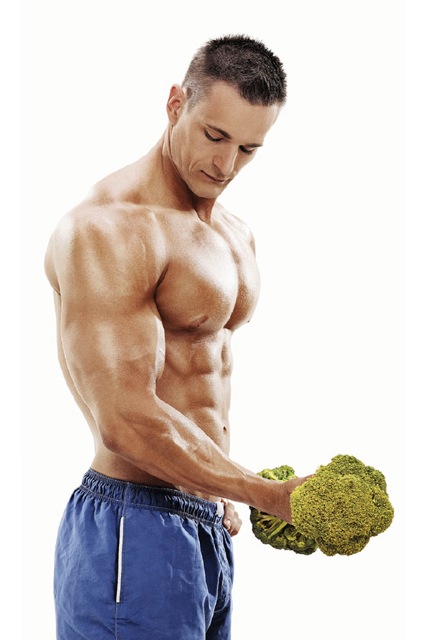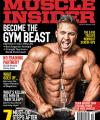Supplement Godfather


Vegan Bodybuilding
A plant-based diet and vegan lifestyle is becoming more and more popular nowadays, especially in Canada and even with top-caliber athletes. Why is this? Well, I believe that people are becoming more educated on the health benefits and positive effects on the environment that a plant-based diet delivers over one that includes animal products. It’s a positive sign; I mean, people actually care more about their health and the impacts they’re having on the environment than they ever have before, myself included! I’m not one to judge, and I have absolutely nothing against people that eat a lot of animal products and meat. In fact, most of my friends and family all eat a ton of meat! But for ethical, environmental, and health reasons, I’ve chosen to adopt a primarily plant-based diet. Even if you still include animal products in your diet, and even if they’re a large percentage of your diet, everyone can still benefit from plant-based foods, and more specifically plant-based proteins. Whether you’re a dedicated meat-eater or hardcore vegan, read on to learn more about the benefits of plant-based nutrition and how you can incorporate it into your fitness plan to help you reach your goals, no matter what they are!
Why Do People Follow A Vegan Lifestyle For Fitness?
Whenever I tell people that I’m transitioning over to a plant-based diet, the first thing they ask me is why. Well, there are two or three main reasons why I, and many others, am adopting a vegan lifestyle.
Environment
One of the primary reasons people become vegetarian or vegan is because of the positive impact it can, and will, have on the environment and the world we live in. A 2010 United Nations (UN) report emphasized that a global shift towards plant-based nutrition is critical to help reverse the negative impacts of climate change and reduce world hunger. The UN report goes on to explain that as the global population continues to rapidly increase, western diets high in meat and dairy products are simply unsustainable. Here are a few more alarming statistics. The livestock industry arguably has the greatest negative impact on the environment and world. It has a major impact on climate change and is responsible for 18 to 20 percent of the world’s greenhouse gas emissions. The livestock industry is also responsible for over 60 percent of anthropogenic ammonia emissions, which causes acid rain and acidification of ecosystems. The growth of the livestock industry also negatively affects the world’s fresh water supply, is a major source of pollution, causes land degradation, and reduces biodiversity.

Ethics
Another reason some people decide to stay away from animal products is because of the way some animals are raised and treated. In fact, many animals are forced to live in unsanitary, overcrowded conditions and are slaughtered in very inhumane ways. Okay, enough of my environmental and ethical rants. Let’s move on to the positive health effects that a plant-based diet can provide!
Health Benefits
Mountains of research show that plant-based diets are optimal for human health. They can help reduce blood pressure and cholesterol levels and regulate blood sugar. Plant-based diets are effective at treating chronic diseases, such as arthritis, cancer, diabetes, chronic obstructive pulmonary disease (COPD), and cardiovascular disease.
Several studies show a clear link between a plant-based diet and a reduction in cancer risk. On the other hand, a diet high in meat is linked to an increased cancer risk. The same goes for heart disease and especially for men. Cardiovascular disease is one of man’s worst enemies, but it can be avoided. Studies show that a reduction in consumption of animal products can dramatically reduce the risk of cardio disease. Plant-based diets contain a ton of health-promoting nutrients, but very little saturated fat and cholesterol, which are heart health killers.
IS IT POSSIBLE TO BUILD MUSCLE WITHOUT MEAT?
Of course it’s possible to build muscle without meat. Let’s take a look at how one goes about building muscle. We work out, train hard with resistance, and break down muscle fibers, which then repair and grow bigger with the help of nutrients such as proteins, fats, and carbs. The amino acids found in protein, specifically leucine and the other two branched-chain amino acids (BCAAs), isoleucine and valine, have the greatest impact on muscle growth and recovery. Animal-based products contain high amounts of BCAAs and the other essential amino acids, which is why many people consume protein from animal sources. However, a good variety of plant-based proteins can also deliver the body with high amounts of BCAAs and essential amino acids and deliver the exact same muscle-building effects as animal-based proteins!

WHAT ARE THE BENEFITS OF VEGAN PROTEIN OVER ANIMAL PROTEIN?
As I already explained, there are many health benefits to a plant-based diet over one that includes lots of animal products. These same benefits apply to plant-based proteins over animal proteins. In addition, many people have food sensitivities or allergies to various animal-based protein sources, such as dairy. A large percentage of the population has an allergy or sensitivity to dairy products, and this includes things such as whey protein and casein. Other people have a hard time digesting and utilizing the protein from meats, especially red meat. Most plant-based protein sources are hypoallergenic (meaning the majority of the population has absolutely no allergy to them) and are very easy for the body to digest and use. This is actually another reason why almost all of my protein sources are plant-based: My body can simply digest and use them much more efficiently.
WHAT ARE SOME OF THE TOP VEGAN PROTEIN SOURCES?
In my “Supplement Godfather” column on page XX of this issue, I go into more detail on my favourite plant-based protein sources, but here’s a quick recap of some of the best and most popular vegan protein sources:
Hemp
Many consider hemp protein the king of all plant proteins because it’s an excellent source of complete protein and provides a high level of BCAAs and essential amino acids. Hemp protein provides fibre and essential fatty acids (EFAs) and is a good source of many vitamins and minerals. It’s one of the least allergenic of all protein sources.
Yellow Pea
Yellow pea delivers all the essential amino acids and is high in BCAAs, lysine, arginine, and glutamine, all of which are important for muscle growth and recovery. Yellow pea is a great source of iron and is also hypoallergenic.
Sacha Inchi
Sacha inchi protein is also hypoallergenic and delivers a high content of aminos, including all nine essential amino acids. It’s higher in tryptophan and makes for a perfect complement to hemp and pea protein, which tend to have lower tryptophan content.
Brown Rice
Brown rice protein delivers an excellent amino acid profile and is particularly high in cysteine and methionine. The only downside to brown rice protein is that it’s very challenging to find a raw material source that doesn’t have high levels of heavy (toxic) metals, such as lead, cadmium, arsenic, and mercury.
Soy
There is good and bad soy. Good soy comes from natural, whole soybean sources (and the least refined sources), such as fresh tofu, edamame beans, tempeh, and natto. Bad soy comes from highly refined sources, such as soy protein isolate. This is the stuff that people cannot digest and causes harm.

Some other good plant-based protein sources, although they don’t have quite as high a percentage of protein, include chia, flaxseed, quinoa, artichoke, cranberry seed, spirulina, spinach, broccoli, kale, pumpkin seed, and amaranth.
WHAT NUTRIENTS CAN BE LACKING IN A VEGAN DIET?
Although a vegan diet is extremely healthy, it can sometimes be lower in vitamin D, calcium, zinc, and vitamin B12. All it takes is a little planning and preparation to avoid deficiencies of these nutrients. High levels of these nutrients can easily be obtained from a vegan diet with proper planning and a wide variety of foods!
3 SIMPLE VEGAN MUSCLE-BUILDING TIPS
Pro Vegan Tip #1: Drink Plant-Based Protein Shakes
One of the easiest ways to ensure your body is getting the right amount of protein and nutrients from a plant-based diet is through protein shakes. If your plant-based meals are lacking in protein, simply have a scoop or two of a good quality vegan protein powder with your meal. Another great option is to make a nutrient-dense plant-based protein shake (that includes protein, carbs, and fats) and have that in between your main meals of the day. This strategy works really well for many people, especially those who need extra calories and don’t have a lot of time to eat throughout the day.
Pro Vegan Tip #2: Prepare Your Protein Sources in Advance
As I already mentioned, planning and preparation is key to a good plant-based diet. But this isn’t anything out of the ordinary for top athletes and physique competitors who already meticulously plan and prep all their meals in advance. A proper plant-based diet just requires a bit more self-education to ensure you’re getting appropriate levels of protein, amino acids, and all other vital macro- and micronutrients needed by an active body.
Pro Vegan Tip #3: Don’t Be Afraid of Clean Carbs and Fat
Carbs and fats aren’t the enemy. Quality, unprocessed carbs and healthy essential fats are critical to muscle growth. Make sure your diet contains proper amounts of clean carbs and essential fats, and they will support a positive anabolic environment for muscle growth to occur. About 15 years ago when I first got into bodybuilding, one of the kinesiologists that I used to work with would always remind me that both carbs and fat are protein-sparing nutrients. So don’t be afraid of them, especially if you’re trying to pack on muscle!
Check out our review on Iron Vegan's Sprouted Protein, if you're looking for alternatives to whey and animal derived proteins!

